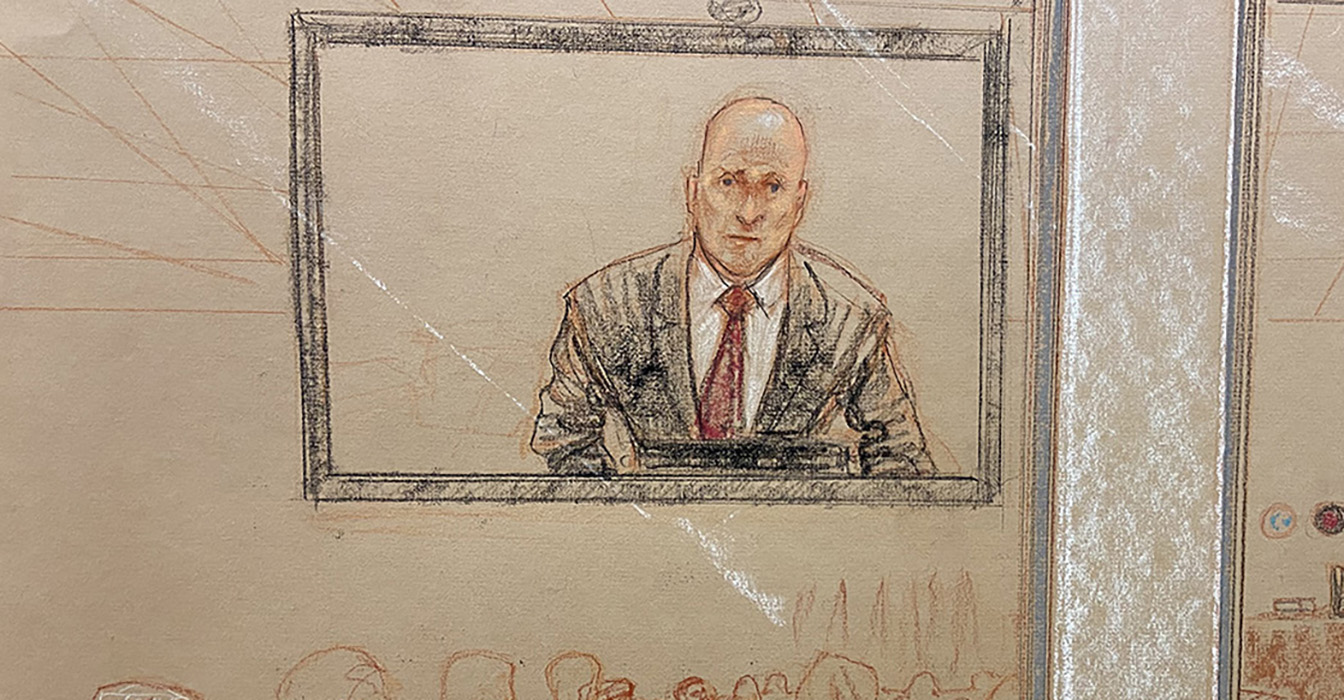Guantanamo Naval Base, Cuba – Ammar al Baluchi, potentially the sole remaining defendant for a death penalty trial in the 9/11 case, suffered traumatic brain injury, post-concussion syndrome and Post-Traumatic Stress Disorder, a clinical psychiatrist testified last week. The injuries resulted from abusive treatment by the CIA before al Baluchi arrived on Guantanamo Bay, he testified.

Dr. David Hanrahan, a retired Navy doctor who has evaluated thousands of American service members for brain injuries and PTSD, diagnosed al Baluchi in October 2018 after interviewing him for 11 hours over three days in a meeting cell at the Guantanamo Bay detention center.
Was your diagnosis "a close call," al Baluchi's lead lawyer, Jame Connell, asked on Thursday.
“It was not,” Hanrahan replied.
Hanrahan testified that al Baluchi suffered from headaches, insomnia, nightmares, anxiety, depression, memory loss, and difficulty concentrating and tolerating light, among other symptoms. Those symptoms, discussed with him by al Baluchi in October 2018, matched those summarized in CIA reporting from the black sites and in medical reports by prison staff after al Baluchi’s arrival on Guantanamo Bay in September 2006.
Al Baluchi acknowledged his role facilitating the Sept. 11 attacks shortly thereafter, in January 2007, to FBI agents seeking to build criminal cases against him and the other 9/11 suspects. Al Baluchi's team is now asking the judge, Air Force Col. Matthew McCall, to suppress the confessions based, in part, on his past torture by the CIA; the government claims these statements were given voluntarily to the FBI.
Under cross-examination by prosecutor Army Col. Joshua Bearden, Hanrahan acknowledged that individuals with traumatic brain injury and PTSD can still make informed decisions, even on complex legal topics.
“Can they provide information that is reliable and voluntary?” Bearden asked on Friday morning.
“That is a possibility,” Hanrahan said.
Hanrahan also acknowledged that his diagnosis relied in large part on al Baluchi's "self-reporting" of symptoms and that criminal defendants often have motivations to exaggerate their conditions.
Hanrahan is one of the last witnesses agreed to by the defense and prosecution teams for the suppression hearing, which began in September 2019; two witnesses remain on the schedule for this session, which was scheduled to last five weeks. McCall plans to hear oral arguments in November on whether the disputed confessions can be admitted into evidence at trial. That leaves open the possibility he could rule before his planned retirement at year's end.
Hanrahan testified from the court’s remote hearing room in Virginia. McCall, meanwhile, presided from a Guantanamo Bay courtroom that was unusually roomy due to the dramatic events of the prior hearing. On July 31, the court overseer, known as the “convening authority,” signed plea agreements with the accused mastermind of the 9/11 plot, Khalid Shaikh Mohammad, and the two other co-defendants, Walid bin Attash and Mustafa al Hawsawi. All three agreed to plead guilty in deals that removed the death penalty as a sentencing option. Amidst intense political opposition to the deals, Secretary of Defense Lloyd Austin revoked them two days later. He asserted the authority to reach any such agreements as resting with himself, removing it from Susan Escallier, whom he appointed to the role of convening authority last year.
The deals would leave al Baluchi as the only defendant for the still-unscheduled trial, intent on moving forward for rulings on the legal implications of the abuse he endured, among other pretrial issues. McCall removed the fifth defendant, Ramzi bin al Shibh, from the case in September 2023 after determining he was not mentally competent to participate in his own defense.
Al Baluchi's co-defendants filed motions seeking to enforce the plea deals and challenging Austin's authority to revoke the signed agreements. Lawyers for Mohammad, bin Attash and al Hawsawi are not participating in this session's hearing, though McCall has ordered each team to have one lawyer observing the proceedings from either the Guantanamo court or the remote facility.
While the defense teams argue McCall must enforce the agreements and hear the entry of guilty pleas, the prosecution asserts Austin acted lawfully in his role as the “superior convening authority” of the military court.
At the start of this hearing, McCall said that he may hear oral arguments on the plea deals at some point during the five weeks. However, defense lawyers also said that briefing on the dispute, which is not yet complete, may induce the judge to hold those arguments during the November hearing – a schedule that would push any ruling to well after the Nov. 5 presidential election.
For now, McCall is prioritizing hearing testimony from the final tranche of witnesses, all of whom are mental health professionals set to opine on the effects of the CIA’s treatment of the accused and the harsh isolation imposed on them upon their arrival to Guantanamo Bay.
The first psychiatrist to treat the defendants on Guantanamo Bay testified for the government in the prior session that she medically cleared al Baluchi to participate in his January 2007 interviews with the FBI. In the view of “WK5I,” the doctor’s pseudonym for purposes of the litigation, al Baluchi suffered anxiety, panic attacks and depressive symptoms but did not have PTSD. She said he did not report any problems associated with the FBI meetings. Al Baluchi generally responded well to the self-help book, “Mind Over Mood: Change How You Feel by Changing the Way You Think,” she testified.
Defne Ozgediz, one of al Baluchi’s civilian lawyers, cross-examined WK5I during the first two days of this hearing. Al Baluchi still has the same copy of “Mind Over Mood” that she gave him about 17 years earlier, Ozgediz related.
“It’s encouraging that he still has it,” WK5I replied.
WK5I acknowledged that she and the psychiatrist who succeeded her in April 2007 prescribed al Baluchi a total of nine psychotropic drugs in an effort to help his anxiety, depression and sleep problems. She also testified that she was never given access to CIA reporting that detailed al Baluchi’s most severe treatment, and that she never probed the abuse with him. WK5I testified she reported up her chain of command al Baluchi’s complaint that in 2003, during the early phase of his captivity at the black sites, CIA interrogators caused him a severe head injury.
Al Baluchi suffered his traumatic brain injury from intense bouts of walling, Hanrahan, who followed WK5I on the stand, testified. Walling was among the CIA’s “enhanced interrogation techniques” and entailed a detainee being repeatedly slammed against a wall. In his direct examination, Connell referred to a CIA inspector general report that stated interrogators practiced walling on al Baluchi to gain their “certification” to use the technique on other detainees.
Hanrahan testified that, during their October 2018 meetings, al Baluchi reported that he became unconscious for an unspecified time from the walling and later woke up chained and naked in a different location. He described al Baluchi as friendly and charismatic but also suspicious and secretive when asked about his past CIA torture, which caused him to become “emotionally disturbed.”
Prior to meeting al Baluchi, Hanrahan was able to review CIA reporting on him, as well as his medical reports from the Guantanamo Bay prison in a sensitive compartmented information facility or “SCIF.” However, he was not allowed to take notes.
Hanrahan could prove the last witness to testify for the defense, as McCall has hinted that he will be able to rule on the suppression dispute without resolving defense motions to compel up to 100 covert CIA witnesses whom the government has placed off limits. In May, Dr. Charles Morgan, a forensic psychiatrist testifying for the defense, said that al Baluchi was suffering from PTSD during his FBI interviews and that his responses would have been conditioned by the CIA's earlier brutality.
Hanrahan testified that the al Baluchi team approached him in 2016, when he was still on active duty. He agreed to evaluate the defendant because he found “fascinating” the idea of treating “a 9/11 terrorist,” or the enemy, “like a friendly.” When Connell followed up on the topic Friday morning, Hanrahan said he was guided by the philosophy imparted to him by one of his mentors, who had served during World War II.
“Treat first, then execute,” Hanrahan, stone-faced, explained.
The witness, who was prone to thoughtful pauses during his testimony, retired from active duty in 2021 and now has a private psychiatry practice in Miami.
Hanrahan’s testimony underscored the government’s “weaponization” of the national security privilege and over-classification of evidence, Connell argued at week's end. For instance, he said, Bearden’s cross-examination of Hanrahan repeatedly implied criticism that his diagnostic report on al Baluchi in October 2018 did not include references to collateral reports or witnesses – though it was the government that had made this information unavailable.
McCall said that he understood Connell’s concerns. The judge, who has twice delayed his retirement to bring the suppression hearing to a conclusion, has repeatedly indicated that he will consider the restrictions imposed on the defense teams when ruling on whether to admit the so-called clean confessions to the FBI into evidence.
At the start of the second week, the government called neuropsychologist Dr. Thomas Guilmette as a rebuttal witness to Hanrahan. Under questioning by Bearden, Guilmette testified that he did not believe al Baluchi suffered a traumatic brain injury because his symptoms were self reported and not corroborated by CIA medical reports at the time of the walling sessions or shortly after. A diagnosis of TBI would have required a documented loss of consciousness, an alteration of consciousness or a period of post-event amnesia, Guilmette testified.
On cross-examination, he acknowledged, however, that al Baluchi was captured in Pakistan at the end of April 2003 and that the CIA medical reports discussed in court did not begin until May 17. Guilmette could have changed his assessment had a CIA cable during the unexplained gap documented what al Baluchi said he experienced – losing consciousness after multiple hours of walling before regaining it while being held up by chains in his cell, he told Rita Radostitz, one of al Baluchi's civilian lawyers.
Guilmette also testified that he was not aware that the CIA officer in charge of the al Baluchi interrogations, referred to in court as “NX2,” had been disciplined for using unapproved techniques on detainees. He did not know the identities, qualifications or possible disciplinary records of any of the interrogators or medical professionals involved in al Baluchi's treatment at the black sites, Guilmette said.
Guilmette was contracted with the government through his membership with The Forensic Panel, which provides experts for litigation. That group is chaired by forensic psychiatrist Dr. Michael Welner, the government's final planned witness who is scheduled to testify in this session's fourth week, beginning Oct. 7. After Guilmette finished his testimony Tuesday morning, McCall said he would not hold any court during the third week to give the al Baluchi team time to prepare for its cross examination.
Connell has told reporters that al Baluchi is interested in a plea deal but wants guarantees related to torture rehabilitation. Prior to Austin's asserted revocation of the deals, the government had estimated that a sentencing trial for the defendants pleading guilty could take place next summer. If the three defendants rejoin the litigation based on how McCall rules on the legality of the attempted revocation of the plea deals, the judge has said they will be given the opportunity to recall recent witnesses.
About the author: John Ryan (john@lawdragon.com) is a co-founder and the Editor-in-Chief of Lawdragon Inc., where he oversees all web and magazine content and provides regular coverage of the military commissions at Guantanamo Bay. When he’s not at GTMO, John is based in Brooklyn. He has covered complex legal issues for 20 years and has won multiple awards for his journalism, including a New York Press Club Award in Journalism for his coverage of the Sept. 11 case. His book on the 9/11 case is scheduled for publication early next year


